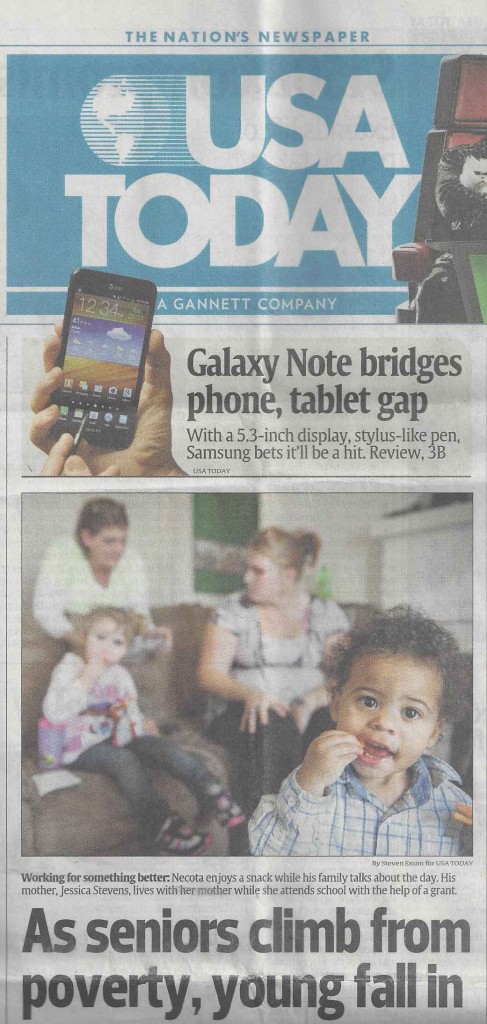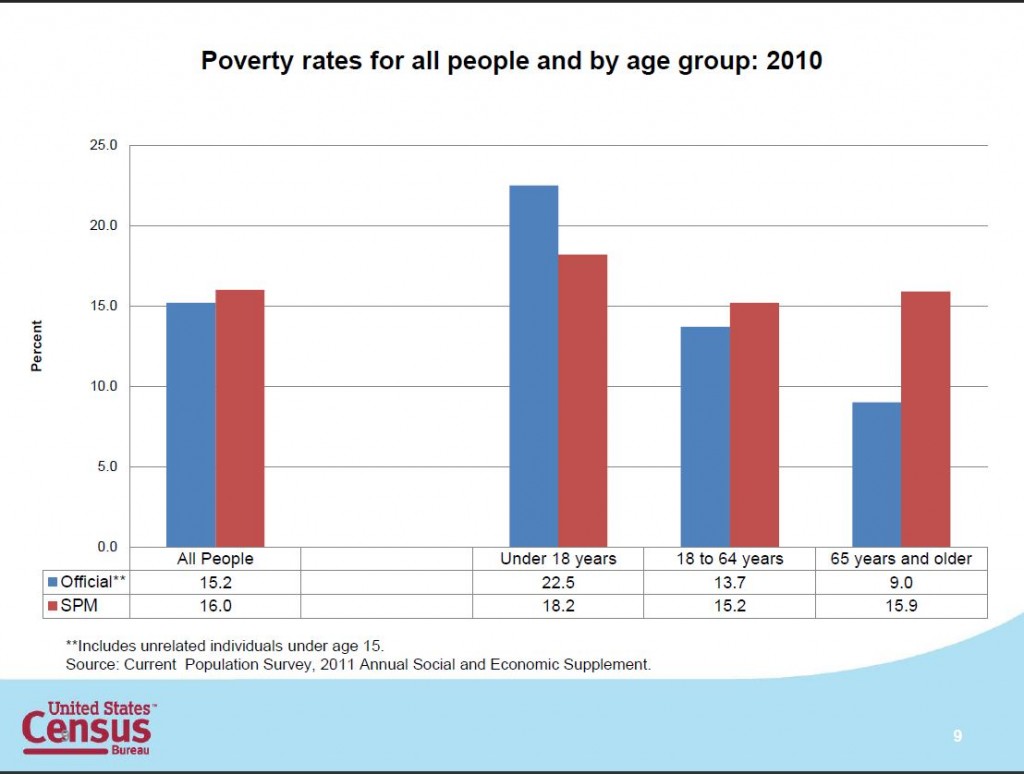 In the more than 30 years I've been with my wife, a professional journalist, I've learned two really important things about working with the media: 1. If you want to talk to "the media," call early, before deadline pressures mount, and 2. Reporters don't write the headlines; some editor does the headline late in the process, often without much feedback or sense of the context.
In the more than 30 years I've been with my wife, a professional journalist, I've learned two really important things about working with the media: 1. If you want to talk to "the media," call early, before deadline pressures mount, and 2. Reporters don't write the headlines; some editor does the headline late in the process, often without much feedback or sense of the context.
So last week when I found a USA Today in my hotel with the front page headline, "As seniors climb from poverty, young fall in: Social programs aid elderly; children suffer in recession," I knew there was no reason to take issue with the reporter, Marisol Bello, or even necessarily with her story.
Indeed, while I might quibble about some of the facts in the story, for the most part I thought it was fair and accurate. (My quibble is that as reported last November, because of much higher out-of-pocket medical costs, poverty rates among older adults may be mischaracterized by standard measures.) The Social Security program since 1935, when combined with Medicare since 1965, has been overwhelmingly successful in combating historically astronomical poverty rates among older Americans. And, because older adults are less tied to income from work and their benefits are not funded by the states, when recession takes jobs and restricts state-level safety-net benefits, older adults are less affected than younger populations.
 But I do question the juxtaposition of the two trends in the headline. It might seem reasonable on the face of it, and it certainly doesn't SAY that there is a causal connection between reductions in senior poverty and increases in child poverty, but what else could it mean to put those two ideas in the same sentence? Plus, why compare these two trends? Why not "As global warming goes up, so does child poverty? “ Why not "As the years pass, elder poverty goes down and child poverty stays the same?" That is actually a more accurate description of the child poverty situation since 1980.
But I do question the juxtaposition of the two trends in the headline. It might seem reasonable on the face of it, and it certainly doesn't SAY that there is a causal connection between reductions in senior poverty and increases in child poverty, but what else could it mean to put those two ideas in the same sentence? Plus, why compare these two trends? Why not "As global warming goes up, so does child poverty? “ Why not "As the years pass, elder poverty goes down and child poverty stays the same?" That is actually a more accurate description of the child poverty situation since 1980.
In addition to traveling to Alabama last week, where I picked up my USA Today, I also spent some vacation days in Washington DC. My stay in DC included a visit to the Newseum, an interactive museum about the news industry and the first amendment founded, like USA Today, by the Gannet Corporation. (Disclaimer: my wife worked for Gannet 15 years ago and one of the JAHF board members is a former Gannet senior executive.) On the wall at the Newseum was the quote, "When a dog bites a man, that is not news, because it happens so often. But if a man bites a dog, that is news." As with men biting dogs (yuck, furry!), I think there is clearly something that the editors at USA Today thought was newsworthy in the surprise or even moral indignation aroused by the contrast between elder poverty going down and child poverty "going up" that made it worth being the headline.
The story cites an Urban Institute analysis that found that total annual public spending per child was $11,300 while public spending for seniors was $24,800. Sounds unfair? But the senior share includes social security and Medicare programs that people paid into during their working lives, supporting past generations of older adults, and represents most of available retirement income for most people. Plus, the numbers don't take into account that children have parents who are responsible for caring for them, buying them food and health care. So is this comparison relevant? Would it make sense for some state or federal program to pay me another $13,500 each for my children to equalize what is spent on older people?
The sentence that follows the Urban Institute analysis effectively "takes back" the implied claim of an unfair difference: “‘But it's not about elderly vs. children,’ says Olivia Golden, a senior fellow at the Urban Institute. Instead, she says it is important to see what can be learned from the lower poverty rates for seniors and apply it to reducing child poverty.” A laudable goal, surely. But overall, this story, and especially its headline and surface impression, serves to undermine the legitimacy of the benefits that have been earned by older adults and create a false sense of competition between the well-being of children and older people. It plays into the "Greedy Geezer" narrative that I think is false and misleading about the realities of aging and the potential solutions to our budget problems.
At the Hartford Foundation, we certainly believe that as a nation we should reduce health care spending per capita and particularly reduce wasteful and ineffective spending that is driven by the failure of the health care system to deliver the right care to older adults. That is why we believe that health care providers need better training and better models of care to enable them to truly meet the needs of older people. I also believe that providing high-quality health care to older people is one of the ways to keep them productively engaged (e.g., in work) so as to reduce some of the other costs of an aging population. But at the end of the day, unless you plan to keep Social Security and Medicare taxes in place but spend that revenue on other things, I don't think this comparison offers any plausible policy solutions.
